Beyond Olympic Fever: Another Arena Sizzles in the Heat!
According to a report by global growth consultancy Frost & Sullivan, the global/Chinese autoimmune drug market is projected to reachUSD 176.7 billion/USD 19.9 billionby 2030, with a2022-2030 CAGR of 3.7%/27.2%.
Global leaders like Novartis, Sanofi, and Johnson & Johnson dominate the autoimmune therapeutics landscape with robust pipelines.
TrendWatch:
Inflammation/Immunity Rivals Oncology
Emerging as theSecond-Largest Drug Market
A Billion-Dollar Frontier Unveiled
Let’sDive Into the Insights:
Autoimmune Diseases — The Biopharma Gold Rush
Navigating Clinical Research Complexities.
Immense Potential in Autoimmune Therapeutics
Autoimmune diseases refer to a category of disorders where the body’s immune system erroneously attacks and damages its own cells, tissues, and organs. Characterized by complex pathogenesis, these conditions are primarily influenced by genetic and environmental factors. In recent years, the global prevalence of autoimmune diseases has risen steadily, affecting approximately5%-10% of the population worldwide, positioning them as thethird most prevalent chronic diseasesfollowing cancer and cardiovascular conditions.
According to the American Autoimmune Related Diseases Association,over 100 distinct autoimmune diseaseshave been identified, including but not limited to systemic lupus erythematosus (SLE), rheumatoid arthritis, psoriasis, myasthenia gravis, multiple sclerosis, ankylosing spondylitis, and vitiligo. China’s vast patient base further amplifies the sector’s potential: in 2021, the country reportednearly 20 million moderate-to-severe atopic dermatitis patients, alongside6.64 million psoriasis patientsand6 million rheumatoid arthritis patients. The substantial patient populations in these therapeutic areas underscore vast growth opportunities for strategic market positioning.
ComplexChallenges in Pharmaceutical Innovation
In response to rising disease prevalence and escalating clinical burdens, global pharmaceutical companies are actively advancing novel drug development. Emerging therapies—including bispecific antibodies, nanobodies, protein degradation platforms, and CAR-T cell therapies—are being deployed in the autoimmune space, aiming to enhance therapeutic precision while minimizing adverse effects. However, clinical research in this field continues to confront multifaceted hurdles.
1. Complex Supply Chains
Many autoimmune therapeutics, such as biologics and antibody therapies, require stringent controls over temperature and humidity during storage and transportation. Maintaining end-to-end cold chain integrity throughout the supply network is imperative to preserve drug stability and efficacy in clinical studies
2.SurgingPersonalizedDemands
Patient heterogeneity and individualized therapeutic needs necessitate tailored dosing strategies. For instance, psoriasisclinicaltrials often mandate drug dispensing based on body surface area and lesion thickness, requiringultra-precise supply planning andresilientsupplymanagement.
3.Suboptimal Patient Adherence
Autoimmune diseases, typically chronic in nature, demand prolonged observation and follow-up in clinical research to evaluate therapeutic efficacy and safety profiles. Patient adherence serves as a critical determinant of trial outcomes, necessitating stringent monitoring and administration for precise drug dispensation and protocol compliance.
4.Escalating FinancialPressures
Extended patient follow-up and resource-intensive multidisciplinary assessments incur substantial operational costs, encompassing data management, pharmaceutical production, logistics, and beyond. Protracted trial timelines, elevated expenses, and heightened failure risks impose significant financial strain on sponsors conducting autoimmune disease research.
Challenges Unveil Opportunities

Drug Forecasting Model—Supply AI
Supply AIdynamically forecasts drug supply and demand, enabling precise determination of optimal drug scaling volumes. This solution facilitates cost savings ranging from millions to tens of millions of yuan per project, significantly reducing drug-related research expenditures.
ePRO/eCOA Solution—ACCMED-eCOA
ACCMED-eCOAadopts a patient-centric approach, prioritizing optimal patient compliance and reliable data collection to eliminate outcome biases and ensure precise trial evaluations. The platform offers a one-stop service for scale procurement, copyright management, translation, and validation, driving measurable improvements in research efficiency and quality.
The distinct characteristics and challenges inherent in autoimmune disease clinical trials demand innovative strategies to surmount barriers—optimizing patient recruitment,advancing biomarker development,adopting novel trial designs,strengthening multidisciplinary collaboration, andenhancing data transparencyemerge as criticalmeasures to address these hurdles.
Partner with Clinical Research Suppliers,
Reduce Costs, Boost Efficiency,Ensure Flawless Quality Control